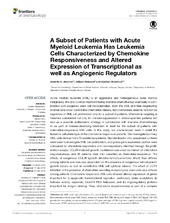| dc.contributor.author | Brenner, Annette | en_US |
| dc.contributor.author | Reikvam, Håkon | en_US |
| dc.contributor.author | Bruserud, Øystein | en_US |
| dc.date.accessioned | 2019-05-15T15:09:09Z | |
| dc.date.available | 2019-05-15T15:09:09Z | |
| dc.date.issued | 2016-05-25 | |
| dc.Published | Brenner AK, Reikvam H, Bruserud Ø. A subset of patients with acute myeloid leukemia has leukemia cells characterized by chemokine responsiveness and altered expression of transcriptional as well as angiogenic regulators. Frontiers in Immunology. 2016;7:205 | eng |
| dc.identifier.issn | 1664-3224 | |
| dc.identifier.uri | https://hdl.handle.net/1956/19654 | |
| dc.description.abstract | Acute myeloid leukemia (AML) is an aggressive and heterogeneous bone marrow malignancy, the only curative treatment being intensive chemotherapy eventually in combination with allogeneic stem cell transplantation. Both the AML and their neighboring stromal cells show constitutive chemokine release, but chemokines seem to function as regulators of AML cell proliferation only for a subset of patients. Chemokine targeting is therefore considered not only for immunosuppression in allotransplanted patients but also as a possible antileukemic strategy in combination with intensive chemotherapy or as part of disease-stabilizing treatment at least for the subset of patients with chemokine-responsive AML cells. In this study, we characterized more in detail the leukemia cell phenotype of the chemokine-responsive patients. We investigated primary AML cells derived from 79 unselected patients. Standardized in vitro suspension cultures were used to investigate AML cell proliferation, and global gene expression profiles were compared for chemokine responders and non-responders identified through the proliferation assays. CCL28-induced growth modulation was used as marker of chemokine responsiveness, and 38 patients were then classified as chemokine-responsive. The effects of exogenous CCL28 (growth inhibition/enhancement/no effect) thus differed among patients and was also dependent on the presence of exogenous hematopoietic growth factors as well as constitutive AML cell cytokine release. The effect of CCR1 inhibition in the presence of chemokine-secreting mesenchymal stem cells also differed among patients. Chemokine-responsive AML cells showed altered expression of genes important for (i) epigenetic transcriptional regulation, particularly lysine acetylation; (ii) helicase activity, especially DExD/H RNA helicases; and (iii) angioregulatory proteins important for integrin binding. Thus, chemokine responsiveness is part of a complex AML cell phenotype with regard to extracellular communication and transcriptional regulation. Chemokine targeting in chemokine-responsive patients may thereby alter AML cell trafficking and increase their susceptibility toward antileukemic treatment, e.g., conventional chemotherapy or targeting of other phenotypic characteristics of the chemokine-responsive cells. | en_US |
| dc.language.iso | eng | eng |
| dc.publisher | Frontiers Media | eng |
| dc.rights | Attribution CC BY | eng |
| dc.rights.uri | http://creativecommons.org/licenses/by/4.0/ | eng |
| dc.subject | Acute myeloid leukemia | eng |
| dc.subject | chemokine | eng |
| dc.subject | CCL28 | eng |
| dc.subject | integrin | eng |
| dc.subject | RNA | eng |
| dc.subject | epigenetic | eng |
| dc.subject | helicase | eng |
| dc.title | A subset of patients with acute myeloid leukemia has leukemia cells characterized by chemokine responsiveness and altered expression of transcriptional as well as angiogenic regulators | en_US |
| dc.type | Peer reviewed | |
| dc.type | Journal article | |
| dc.date.updated | 2019-01-24T10:42:21Z | |
| dc.description.version | publishedVersion | en_US |
| dc.rights.holder | Copyright 2016 The Authors | |
| dc.identifier.doi | https://doi.org/10.3389/fimmu.2016.00205 | |
| dc.identifier.cristin | 1355056 | |
| dc.source.journal | Frontiers in Immunology | |

